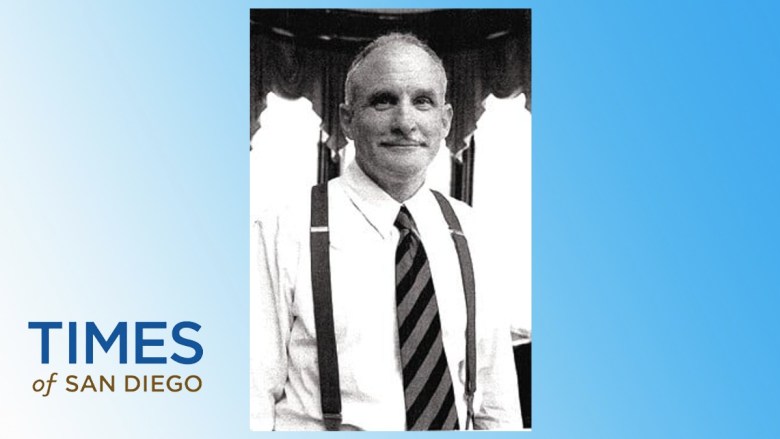
Trial attorney Milton J. Silverman, who successfully defended the family of 12-year-old Stephanie Crowe and Black community activist Sagon Penn in high-profile murder cases, died last week at the age of 80.
He is considered by many of his contemporaries as one of the best, if not the best, trial lawyers of his time. The San Diego attorney’s cases and clients regularly made headlines, beginning in the 1980s and continuing beyond.
“Milt Silverman is a lawyer the likes of whom we will never see again,” said longtime San Diego defense attorney Eugene Iredale. “For 20 years Milt had criminal and civil cases with miraculous results because of his scrupulous attention to detail and his understanding of how to tell a story with his unique voice.”
Silverman passed away peacefully on May 21. “I was so blessed,” said Silverman’s wife, Maria. “We were a team. He loved me; he loved the children. Milt treated me like a delicate flower.”
Silverman handled a wide breadth of cases in his career, but perhaps the best known were the murder of Stephanie Crowe and the arrest that resulted in Sagon Penn shooting and killing a police officer.
Crowe was stabbed to death in her rural Escondido home. There was no sign of forced entry into the home and no forensic evidence that identified the killer. Her brother, Michael Crowe, then 14, and two of his friends confessed to the killing during intense, prolonged police interrogations.
Silverman represented the Crowe family, and his actions led to a dismissal of charges against the boys. Instead, a transient who had Stephanie Crowe’s blood on his shirt was charged. And 13 years later, the Crowe family agreed to accept $7.25 million to settle a federal civil-rights case filed against the cities of Escondido and Oceanside.
Silverman also represented Penn, a man acquitted of killing a police officer in a case that divided San Diego County. He had shot and killed a San Diego police officer, run over another officer and wounded a civilian observer after a traffic stop in Encanto went horribly awry in 1985. Silverman, argued that Penn acted in self-defense in the face of excessive force from police.
San Diego criminal attorney Bob Grimes described Silverman as “an absolute, first-class trial lawyer who excelled at getting a vision of the case with a meticulous investigation and analysis.” Grimes added that Silverman was the only lawyer he ever encountered who “excelled at both criminal and civil cases.”
While many of his criminal cases were headline-grabbing, his legal career spanned a variety of cases as diverse as product liability, toxic torts, defamation, abuse of process, intentional infliction of emotional distress, and misrepresentation, according to his biography.
“He was deadly on cross examination,” said friend and fellow attorney Dennis Schoville. “Milt had an innate ability to really understand people” and “his trial technique and his insight into what he needed to do in cross examination was exemplary.”
Schoville said the Crowe case, which had bounced back and forth in the judicial system for 13 years, showed Silverman’s “brilliance and personal perseverance.” Schoville represented one of the boys wrongly accused of murder in a lawsuit against four Escondido police officers, an Oceanside police officer, and a psychologist, while Silverman represented the victim’s family. Both attorneys were victorious in securing a settlement.
Silverman would go back to court yet again, to have all those accused declared factually innocent, a rare ruling. “He just felt as a matter of justice needed to be done,” Schoville said
Perhaps his most impactful case was the Penn trial.
“In a city known for its conservatism and pro-police attitude, much of the public was convinced it was an open and shut case and guilty verdicts couldn’t come fast enough,” said journalist Tony Perry who covered San Diego for the Los Angeles Times. “Silverman proved otherwise and two juries agreed.”
A book about the case, “Reap the Whirlwind: Violence, Race, Justice, and the story of Sagon Penn,” is set to release in July. Its author, Peter Houlahan, interviewed Silverman extensively over the past two years about his role in defending Penn.
The importance of Silverman’s successful defense had a major impact on San Diego, “as the innocent verdict preceded the riots in South Central Los Angeles in 1992 which also spread to San Francisco and Oakland,” said the book’s author. The verdict proved to be a damper for potential violence here.
“We had been through our own crisis between police and the Black community years before Los Angeles did,” according to former Deputy Chief Norm Stamper, who is quoted in the book. Nine-term congressman Lionel Van Deerlin wrote in a San Diego Union editorial, “This city can add a name to America’s pantheon of legendary defense lawyers: Milton Silverman.”
Mark Sauer, a veteran San Diego newspaperman who covered several cases in which Silverman was the principal attorney, recalled, “Milt Silverman embodied what it means to be a tough trial attorney. He was smart, relentless, legally cunning, with a great sense of showmanship and guile. Milt won multimillion-dollar civil judgments on behalf of noted clients, like Dale Akiki and the Crowe family, by successfully overcoming prosecutorial immunity as few lawyers ever have.”
“He was brash, flamboyant, and completely at ease in the spotlight. And he always was guided by his unerring sense of justice,” Sauer added.
Silverman was noted for his ability to master complex subject matters in preparing for a case. An example was his successful defense of Dr. Maurizio Zanetti, an immunologist accused by the federal government of fraud involving research on HIV vaccines.
“He would spend 14 hours a day working hard right beside me,” recalled Zanetti. “He quizzed me in every possible way,” noting that Silverman was “mentally and emotionally involved with what was happening.”
The case was 25 years ago but Zanetti and Silverman developed a friendship that endured until his recent death.
Silverman was a graduate of San Diego State University in 1966 and UCLA School of Law in 1969. The son of an attorney, his first murder case, when he was 25, was in Vietnam while he was working with the Judge Advocate General’s office.
When he began working in San Diego in private practice he recalled sleeping on the floor in his office and teaching class and bathing at SDSU. He recounted the anecdote in an interview he gave for his Legends of the Bar Award, one in a long list of awards and recognition he received for his years of outstanding work.
In that interview Silverman advised young attorneys new to the justice system that when he began his career, he didn’t understand what noted attorney Clarence Darrow meant when he said “there is no justice either in or out of court.” But 35 years of experience gave Silverman his answer.
“I’ve seen people with righteous cases who are ground up and eaten alive by the system” and others who “should have been punished, brought to justice laugh and sneer in the faces of who they wronged,” he said at the time.
It was those “righteous cases” that motivated Silverman, said Judge Jeffrey Miller, a Senior U.S. District judge who worked in the San Diego Superior Court system for 10 years.
“He was very selective about his cases. And he accepted only those cases that he cared deeply about, that he believed in, that there was an important right to be vindicated. Or where he felt just the need for justice,” Miller said.
Miller first encountered Silverman, who was 40 at the time, in a personal injury trial in Superior Court.
“There were things that stood out to me at that point as he had a presence in the courtroom that I don’t know I had seen from anyone else up to that point in my life,” Miller said. “He had a compelling style about him. He wasn’t bombastic. And he had a tone, a certain way that was authoritative, without being cocky, without alienating people.”
He noted that “Milt Silverman without a courtroom was like Pavarotti without an opera.”
Judge Leo Papas said of Silverman, “Milt knew how to connect to people in a visceral and in intuitive way. He recalled talking with Silverman about his opening statement for the Crowe case. “The civil case settled but the experience was spellbinding and gripping as any murder mystery best seller,” Papas said.
Maria Silverman recalled that she and the family became part of Silverman’s law practice, working in the office with him. She became his second set of eyes. Everywhere he went on a case, she would come along. She would sit in trial court with him, making suggestions during jury selection on which jurors she liked and didn’t like. He trusted her instincts.
When he represented the parents of a daughter who had allegedly been brainwashed by a Krishna sect, the family temporarily moved to Orange County. “We rented a trailer. We stayed there for six months,” recalled his wife. “We used to come back on the weekends, going back and forth. It was always an adventure with my husband.”
Daughter Rose Silverman recalled fear during and after the Penn trial. Her father never left her or her brother alone. It was on a nighttime grocery trip that she saw her father carrying a gun. The family had received death threats, and the San Diego Sheriff’s Department had issued Silverman a gun permit. Eventually the children were sent out of state for their protection.
But what mattered for the family was their father’s love. “We are all about the family and supporting each other and being there for each other and loving each other,” Rose Silverman said. “He was all about family, and about law and justice.”
The family wants their friends to know that “Milt went home surrounded by his loving family leading him into the presence of God with the beautiful music of Paul Wilbur.”
Silverman is survived by his wife Maria, daughter Rose, son Richard and four grandchildren.
A memorial service is being planned at the First Church of the Nazarene in late June.
